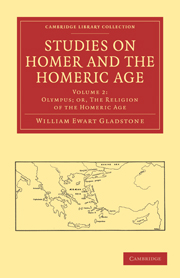Book contents
- Frontmatter
- Contents
- OLYMPUS: OR THE RELIGION OF THE HOMERIC AGE
- SECT. I On the mixed character of the Supernatural System, or Theo-mythology of Homer
- SECT. II The traditive element of the Homeric Theo-mythology
- SECT. III The inventive element of the Homeric Theo-mythology
- SECT. IV The Composition of the Olympian Court; and the classification of the whole supernatural order in Homer
- SECT. V The Olympian Community and its Members considered in themselves
- SECT. VI The Olympian Community and its Members considered in their influence on human society and conduct
- SECT. VII On the traces of an origin abroad for the Olympian Religion
- SECT. VIII The Morals of the Homeric Age
- SECT. IX Woman in the heroic age
SECT. X - The Office of the Homeric Poems in relation to that of the early Boohs of Holy Scripture
Published online by Cambridge University Press: 05 October 2010
- Frontmatter
- Contents
- OLYMPUS: OR THE RELIGION OF THE HOMERIC AGE
- SECT. I On the mixed character of the Supernatural System, or Theo-mythology of Homer
- SECT. II The traditive element of the Homeric Theo-mythology
- SECT. III The inventive element of the Homeric Theo-mythology
- SECT. IV The Composition of the Olympian Court; and the classification of the whole supernatural order in Homer
- SECT. V The Olympian Community and its Members considered in themselves
- SECT. VI The Olympian Community and its Members considered in their influence on human society and conduct
- SECT. VII On the traces of an origin abroad for the Olympian Religion
- SECT. VIII The Morals of the Homeric Age
- SECT. IX Woman in the heroic age
Summary
Even if they are regarded in no other light than as literary treasures, the position, both of the oldest books among the Sacred Scriptures, and, next to them, of the Homeric poems, is so remarkable, as not only to invite, but to command the attention of every inquirer into the early condition of mankind. Each of them opens to us a scene, of which we have no other literary knowledge. Each of them is, either wholly or in a great degree, isolated; and cut off from the domain of history, as it is commonly understood. Each of them was preserved with the most jealous care by the nation to which they severally belonged. By far the oldest of known compositions, and with conclusive proof upon the face of them that their respective origins were perfectly distinct and independent, they, notwithstanding, seem to be in no point contradictory, while in many they are highly confirmatory of each other's genuineness and antiquity. Still, as historical representations, and in a purely human aspect, they are greatly different. The Holy Scriptures are like a thin stream, beginning from the very fountainhead of our race, and gradually, but continuously finding their way through an extended solitude, into times otherwise known, and into the general current of the fortunes of mankind. The Homeric poems are like a broad lake outstretched in the distance, which provides us with a mirror of one particular age and people, alike full and marvellous, but which is entirely dissociated by an interval of many generations from any other records, except such as are of the most partial and fragmentary kind.
- Type
- Chapter
- Information
- Studies on Homer and the Homeric Age , pp. 521 - 533Publisher: Cambridge University PressPrint publication year: 2010First published in: 1858



